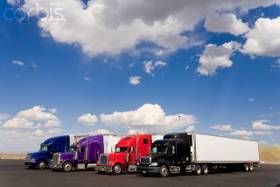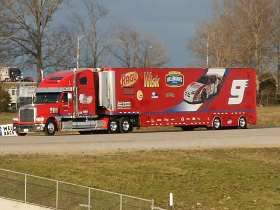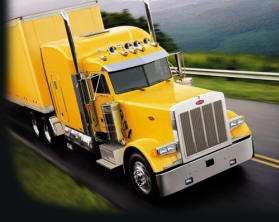Texas Oil Field Driving Jobs.
Topic 1492 | Page 1

Oil field work is a hybrid type of job. And being that, the company knows that it will have to give some training to any drivers that come on board. Having said that, I think with your experience, you would be a good candidate. But all you have to do is apply to find out..so find the companies, and start contacting them. They will make up their mind after seeing your application and speaking with you. Keep us up to date on your experience...We'd like to know what those oild fields are REALLY like. One word of warning...if you are thinking of going into the Dakota's ND/SD..the house ing, unless provided by the company is hard to find, and expensive if you can find it.... Good Luck.... And WELCOME TO TRUCKING TRUTH !!!!
HOS:
Hours Of Service
HOS refers to the logbook hours of service regulations.
I deliver to the nd oilfields alot. Pipe and what not, everything out there is priced sky high.

Starcar is correct. There are a lot of different things you can get into - hauling water to drilling rigs, hauling crude oil to the pipeline, hauling drilling rigs and other BIG equipment - there are a lot of choices. The "Hot Shot" business is big out here (West Texas) too but it's kind of a "good ole boy" network and very competitive. As far as the terrain; nothing very tall or steep anywhere in Texas. Most of the "Permian Basin" where I live is flat as a table top.
Most companies want a couple years experience but the equipment out here is as varied as the type of work. But, from my perspective, once you learn how to use a clutch and a transmission...well...to me it's like riding a bike.
FYI - I'm looking into getting into hauling crude oil. I did it 30 years ago and made good money. Since, I've done other things but now considering getting my CDL again and going that rout.
It'll be interesting to see what you decide.
CDL:
Commercial Driver's License (CDL)
A CDL is required to drive any of the following vehicles:
- Any combination of vehicles with a gross combined weight rating (GCWR) of 26,001 or more pounds, providing the gross vehicle weight rating (GVWR) of the vehicle being towed is in excess of 10,000 pounds.
- Any single vehicle with a GVWR of 26,001 or more pounds, or any such vehicle towing another not in excess of 10,000 pounds.
- Any vehicle, regardless of size, designed to transport 16 or more persons, including the driver.
- Any vehicle required by federal regulations to be placarded while transporting hazardous materials.

I am just now in my first week of CDL school but as a native Texan and current Texas resident, I can tell you that the jobs are here, especially out in the Midland/Odessa area. The problem with the energy business is always the same though. Here today, gone tomorrow. Just ask any Texan and they will tell you the same.
CDL:
Commercial Driver's License (CDL)
A CDL is required to drive any of the following vehicles:
- Any combination of vehicles with a gross combined weight rating (GCWR) of 26,001 or more pounds, providing the gross vehicle weight rating (GVWR) of the vehicle being towed is in excess of 10,000 pounds.
- Any single vehicle with a GVWR of 26,001 or more pounds, or any such vehicle towing another not in excess of 10,000 pounds.
- Any vehicle, regardless of size, designed to transport 16 or more persons, including the driver.
- Any vehicle required by federal regulations to be placarded while transporting hazardous materials.
New Reply:
New! Check out our help videos for a better understanding of our forum features

















Preview:








 TT On Facebook
TT On Facebook
Hello everyone!
I just had a few questions about qualifications and such for these oil jobs in Texas. I have had my class A for 7 years. I currently work at a beverage distributor in the Southeast. I guess my main concern is if I would be qualified to do this or it's a pipe dream. I have be in a sales/management aspect for the last three years, although I don't drive/deliver like I did everyday in the past we are still required to maintain medical cards and drive the trucks when needed. The tractor's we have are automatic with a 16 bay trailer, also we have some 6 speeds with a 40' trailer. I will list what I think my positives/negatives are.
Positives:
1. No mvr infractions. 2. Current CDL/medical card. 3. Pass a drug test and DOT exam. 4. College education (not sure this is relevant for this type of position). 5. Ability of get hazmat/tanker in a efficient time frame.
Negatives:
1. No experience with a 9,10,13 speed. 2. No experience in the Texas terrain. 3. No hazmat/tanker endorsement. 4. Limited driving experience in the last few years.
Any help would be appreciated!!
Regards,
B
CDL:
Commercial Driver's License (CDL)
A CDL is required to drive any of the following vehicles:
HAZMAT:
Hazardous Materials
Explosive, flammable, poisonous or otherwise potentially dangerous cargo. Large amounts of especially hazardous cargo are required to be placarded under HAZMAT regulations
DOT:
Department Of Transportation
A department of the federal executive branch responsible for the national highways and for railroad and airline safety. It also manages Amtrak, the national railroad system, and the Coast Guard.
State and Federal DOT Officers are responsible for commercial vehicle enforcement. "The truck police" you could call them.
MVR:
Motor Vehicle Record
An MVR is a report of your driving history, as reported from your state Department of Motor Vehicles. Information on this report may include Drivers License information, point history, violations, convictions, and license status on your driving record.